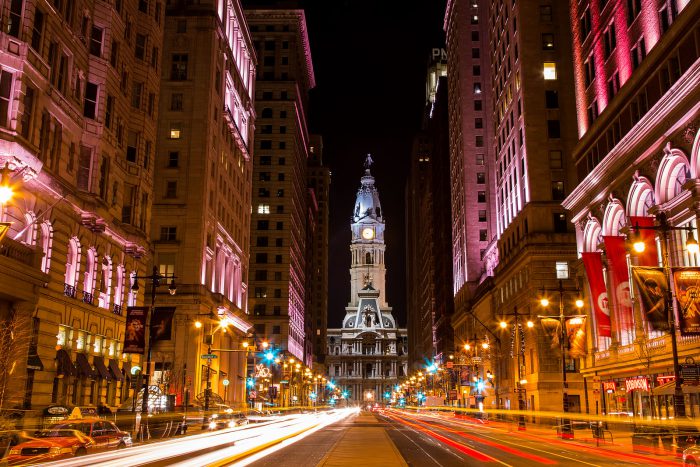
Lenfest is also pledging up to another $40 million in matching funds, and the Institute has plans in place to launch a series of grants as well as a fellowship program to support the advancement of local and metro news.
“There’s a growing sense that the battleground has turned to local media,” Lenfest Institute CEO Jim Friedlich told me. “National media — like The New York Times and The Wall Street Journal — have a visible path to digital transition, but The Philadelphia Inquirers, The Miami Heralds, and Detroit Free Presses of the world have a long way to go.”
“The way philanthropy tends to work is that one commitment leads to another,” he continued. “A couple of months ago, Gerry said to me, ‘You’re doing great. This is what I hoped would happen. I’ll put up another $40 million as a challenge grant so you can approach other funders and offer to double their impact.'”
The matching grant “is not like Kickstarter” and Lenfest will match donations even if the Institute doesn’t get to $40 million, Friedlich said, noting that the Institute has “several years to do it. There’s no pending deadline.”
The $26.5 million that the nonprofit has already raised includes an anonymous $15 million gift and $5 million total from The Philadelphia-based Wyncote Foundation and David Haas, one of its board members, toward the Institute’s endowment.
It also includes $1.3 million in funding from The Knight Foundation to support the Knight-Lenfest Newsroom Initiative, a project to share best practices among metro newspapers. (Disclosure: Knight also supports Nieman Lab.)The Lenfest Institute has a dual mandate of sorts, focusing on the Philadelphia papers and Philly.com while also working on initiatives nationally as well.
In Philadelphia, for instance, the Institute has funded a program for 200 Philadelphia Media Network newsroom staffers to participate in a digital training program. It also helped support an investigative reporting project on lead poisoning in Philadelphia in which the Inquirer partnered with WURD, an African-American–owned and operated radio station.
“To me, it’s a natural continuum. The focus is Philadelphia and markets like Philadelphia. There’s remarkable similarity between the challenges and some of the solutions in Boston, Philadelphia, Minneapolis, and Dallas,” Friedlich said. “We’re learning from The Boston Globe right now, for example, how they have sold more digital subscriptions than any other local metro in the U.S. Dallas has been a leader at reorganizing its newsroom for digital first and training and purposing its great newsroom. Philadelphia, I think is emerging as a leader in new techniques and technologies for investigative news and new forms of storytelling. There’s an arbitrage from market to market.” Prior to joining the Institute last fall, Friedlich led Empirical Media, a consulting firm that Lenfest acquired and made part of the Institute. Empirical worked with many of these metro newsrooms, and helped them develop playbooks for how to advance digitally.Later this month, the Institute plans to announce its next programs: A series of grants to fund projects nationally that focus on ways to support sustainable local journalism and a fellowship program that will bring three to five Lenfest Fellows to Philadelphia to work on projects around big data in news and monetization, design thinking and user-centric design in news, rapid iterative product development, and more. The Institute hopes to work with all sorts of local outlets, not just newspapers.
Friedlich said the Institute will award a collection of “small- and medium-sized grants” up to $100,000 that will focus on areas such as monetization efforts, digital product development, and inclusion and diversity, “which we think is a business and sustainability imperative as well as a social need,” Friedlich said.
The Lenfest Fellowship program will likely last for three to six months, and the Institute hopes the fellows will be able to work on their own projects and also collaborate with and mentor the grant recipients. Though he stressed that the Institute is running both “as a pilot program to see what works best and what doesn’t.”
“We want to build that symbiosis and synergy in from the start rather than have two programs that we hope will talk to each other. The fellows will have a specific role in helping to add value to the grants, and hopefully vice versa,” Friedlich said.
The Institute also plans to support a number of research initiatives, ranging from a study to understand media consumption habits in Philadelphia to looking into the propensity of readers to subscribe to a digital newspaper.
Ultimately though, supporting local journalism will be at the heart of the Lenfest Institute’s mission, and it hopes to be able to share its learnings and best practices with the industry as a whole.
“My view, and the Institute’s view, is that a rising tide lifts all boats,” Friedlich said. “It’s worth noting that in Philadelphia the largest local website by a good margin is Philly.com, and that reaches roughly 20 percent of the market. Facebook reaches about 90 percent of the market. The real competition is to keep a local audience focused on local media and to leverage Facebook and other platforms as a friend in that effort rather than necessarily competing with each other.”